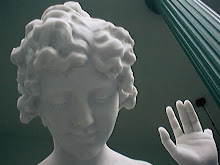
NPR's Weekend Edition today had a segment on Tod Machover, the inventor of the video game and cultural phenomenon known as Guitar Hero, composer of digital music, and creator of hyperinstruments and HyperScore, a software application that supports music composition through non-instrumental inputs similar to the Guitar Hero controllers.
Over the past several years, more and more people are playing Guitar Hero or Rock Band at parties, with their kids, and in their living rooms. Many kids are getting their first exposure to classic Rock through the game. According to Wikipedia, many people buy the songs they play in Guitar Hero, and Guitar Hero is replacing Karaoke at the local bar. And many players step into playing actual real guitars as a result of Guitar Hero, and may benefit from the foundation of dexterity, eye-hand coordination, and ear training that the game provides. However, like the mother who said her kids overestimated their ability to actually play real tennis based on their use of the Wii tennis game, players of Guitar Hero have no understanding of music, technique, or the actual mechanics of playing the guitar.
Machover's vision extends far beyond the commercial: he sees a future where the music in a person's mind can pour out unimpeded by the need to coerce sounds out of a balky instrument, made possible through the interface between the computer and the human body. He asserts:
In a completely unrelated article in the New York Times Magazine today, Lewis Hyde is profiled regarding his work to define the particular landscape of American creativity and the cultural commons on which all creative people should be allowed to draw, re-think, re-assemble, and collaborative re-create into new expressions. His theory is that all creativity is a gift that gains currency and value through being shared. His enemies are the recently expanded copyright laws and growth of intellectual property wars."Imagine if [Guitar Hero] were truly expressive, truly personal, truly creative. The wonderful thing about Guitar Hero is that it opens up the door for everybody to be not just a passive listener but a real active participant in music," Machover says. "I think that is the future of music: music that is a collaboration between what we traditionally think of as composers and performers and the audience."
Interesting that Guitar Hero provides to its players the opportunity to immerse themselves into the experience of performing the American Rock Canon, a most influential piece of our cultural commons. But Guitar Hero exists at the intersection of the opportunity for the commoner to make music without elitist training and the opportunity for money to be made from their desire to do so. Three chord music that retains the dusty DNA of its Deep South plebian origins, and yet, each and every part of it is licensed in a web of copyrights, clearances, royalties, secondary rights, derivative products, and lawsuits. Gibson has sued the company for copyright infringement on their use of the guitar controller. Aerosmith has made more money from Guitar Hero royalties than they have for any album. What do you think the blues players who played for change on the street corners of Mississippi would make of this?

No comments:
Post a Comment